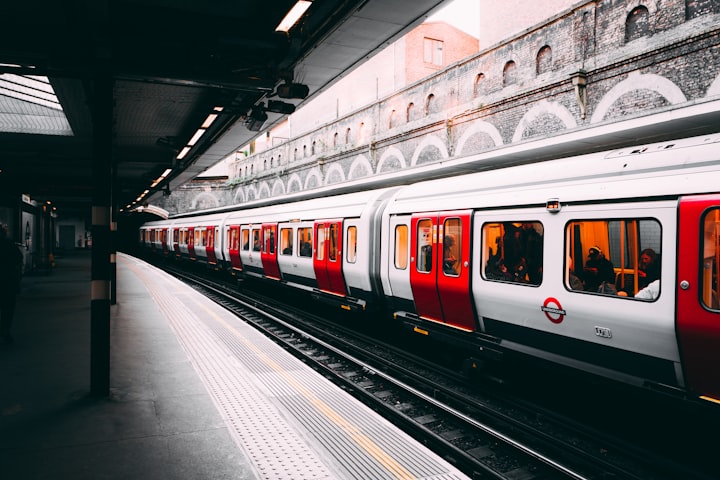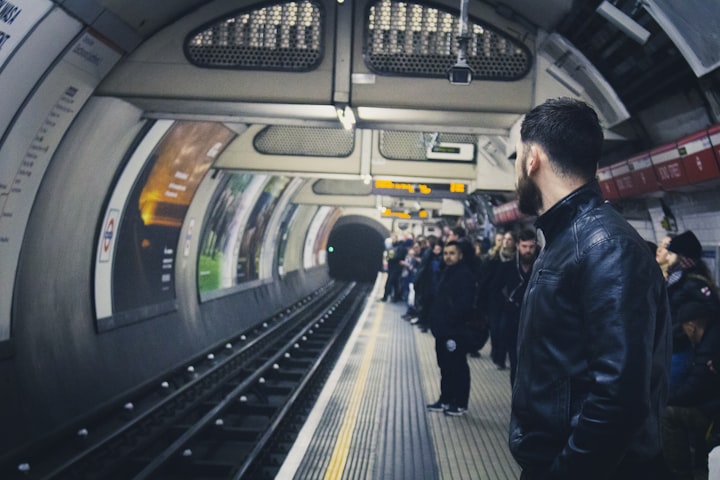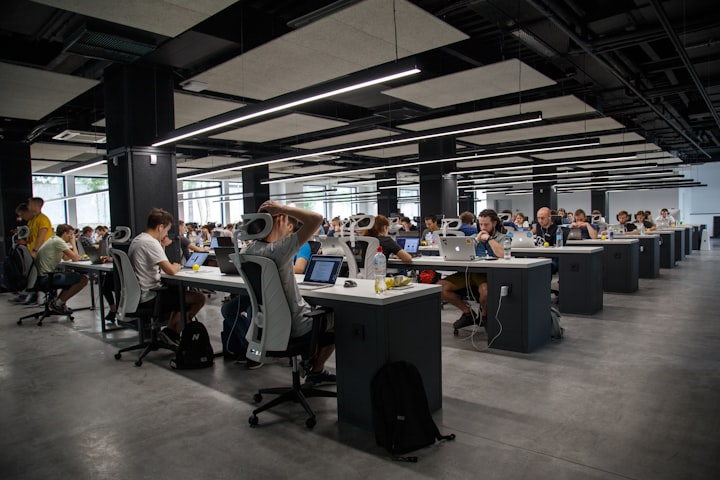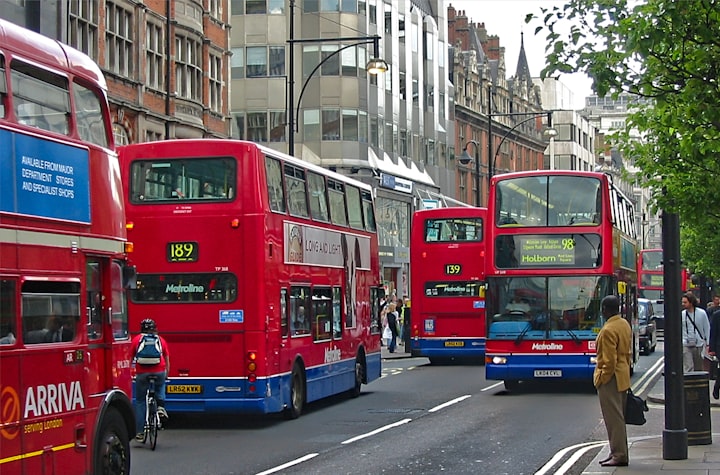The impact of city life on your health
How urban environments affect your physical and mental health

For most of my life, I lived with my family in an isolated mountain village on the border of Switzerland.
I did grow up surrounded by mountains, happy cows and a lot of nature. We lived in an old house and I loved the smell of our old wooden furniture.
In the morning, I woke up with the first sunlight, and at night I could not stop glaring at the fascinating night sky.
When I was in my twenties, I lost the ability to appreciate this little piece of paradise. I chared the wish of many other young people, to move away and live in a vibrant city.
I did not fancy being stuck for the rest of my life on a farm, being always dirty and smelling like cows. Whenever I saw on TV, successful businesswomen walking down London's streets, in their elegant clothes, high heels and the fantastic hair, I envied them. I desperately wanted to be one of those women. They looked perfect even after a busy day at work, earning good money while climbing up the corporate ladder.
Without hesitating, I decided to move to London.
Three years later, I took a look in the mirror and had to admit how city life impacted me.
The missing sound of silence
As much as I love London for being so vibrant and alive, I underestimated the impact of being always surrounded by noise. Like most people, I started my workdays by commuting. 1 hour in the morning rush hour and the same back. The average noise level inside a London tube carriage ranges around 85 decibel - in some parts, for example between Euston and Camden, the noise levels reach 107.7 decibels which is equivalent to the sound we receive by standing 1000 feet away from a starting aircraft (1). Besides the noise, what could be possibly worse, than crowding hundreds of people inside a small, hot, noisy space? Not to mention- all of this at a time of the day where most of us didn't even have their lifesaving morning coffees yet.
London's tube's experience during rush hour was far from the romantic impression some tourists might have.
It felt more like a morning wrestling match.

Soon after I arrived in London, I managed to find a job in a vast office just as I saw it on TV.
They didn't show you on TV that every workday in the office had a constant noise level of 60-70 dB. The nice-looking, open-plan office was a particularly challenging environment. The lack of sound wave breaking structures let noises of different origins quickly accumulate to a loud, distracting aural sound.
Despite multiple studies showed over the years, open-plan offices do not necessarily promote creativity, but add distraction, a lot of companies hold on to the idea.
For me, the office environment was one of the worst, which is not surprising when we look at the science behind it.

A typical conversation between people standing one meter away from us is about 60 dB- a noise level which can already cause speech interferences. Which means I could not understand every word of my conversation, and my brain needed to compensate for the missing words. Humans, in general, have the capacity for 1.6 conversations. When coworkers next to me talked, they took up 1 of the 1.6, which left me with only 0.6 for my inner voice (2).
If we want to or not, we can not - not listen to the conversation.
My brain was in a constant balancing act, trying to compensate the bits I missed. Originating from our evolutionary predecessors, we are particularly alert by fluctuating noise levels which arouses our nervous system.
We can ignore the constant humming sound from our fridge but sounds like conversations that fluctuate in their noise levels are challenging.
Humans have impressive bodies, which have so many different mechanisms to protect us.
Two of them are located in our middle ears- the tensor tympani and stapedius muscles. Together they work as a protective mechanism and modify sound waves' intensity reaching our inner ear -known as the acoustic sound reflex.
When we are stressed and operate on fight or flight mode, this protection mechanism loses its ability to filter noises efficiently. What was originally a needed survival mechanism to hear every sound in a dangerous situation, makes our modern world more overwhelming. Instead of hearing the tiger's footsteps, I heard repetitious ambient sounds such as the air conditioner or my coworkers Saturday night story without blending them out. The overexposure to sound was the origin of my stress. On the other hand, the stress made me even less unable to do what was needed to reduce stress: to block sounds. I found myself soon enough in an escalating cycle of anxiety.
One particular type of sound bothered me the most. Low-frequency noises are a specific environmental noise problem of our modern society. It had the worst effects on my physical and mental health: clothes dryers and underground tubes cause low-frequency vibrating impact sounds. As we are made of 70% water, the intense vibrations are transported through our bodies. At the beginning of human evolution, these vibrations were mainly caused by natural disasters, such as thunder or earthquakes. It was vital for us to feel these vibrations and to run away.
Today, the extended exposure to noise in our environment causes the onset of the hypothalamic-pituitary-adrenal-axis- the release of stress hormones such as cortisol. The state of overarousal makes us unable to filter the noises, which creates even higher arousal levels. This continuous release of stress hormones can impact our physical health by raising the blood pressure, suppresses our immune system and increases anxiety (3). In my case, I was always surrounded by the vibrations of low-frequency sounds. I had rented a cheap room, which was not even 30 meter away from the tube station. Buildings nowadays need to have shock absorbers in their fundament - something no one thought about when building most older houses in London. No one thought about this when creating the London tube either.
The only window in my room was above the main road, filled with traffic 24 hours a day. Often, when I was lying awake at night, I wondered who these people are. Who and more important why is someone driving around the block at two o'clock in the morning, listening to the latest rap music, seemingly honking at any other car on the road.

Day and night, I felt the tube's vibrations underneath the street or listened to cars' noises. No matter how hard I tried, my body did not stop to panic whenever a train approached and continued to send me into a fight and flight mode to run away from a perceived dangerous natural disaster. No earplugs can blend out low-frequency sounds. Neither is there much you can do to limit vibrations.
After one year, I felt more worn out than I had ever before in my life.
I felt tiredness, no amount of sleep would make it go away.I felt constantly on edge, irritated and restless.
When I analysed my lifestyle, I realised that from the first hour of the day, when I commuted to work, to the last hour of the day when I tried to relax and read a book - I was exposed to a very high amount of noise- unnatural noise. To block out these noises, I wanted to overturn them by listening to music or white noises in my room louder than the noise from the outside. It was initially a great idea until I realised that even though I could sometimes cover the road noise, there was no time for my ears or my brain to calm down.
In my mind, I wanted to sit at the bottom of a swimming pool where the world was quiet.
One factor which exaggerates the sound exposure problems in cities is the lack of greenery.
When sound waves hit a flexible material, like trees, they vibrate and deflect sound waves in other directions, but if sound hits a concrete wall, it does not shake, and sound waves reflect off the wall and back toward the source (4). The lack of trees and the vast amount of concrete walls create an echo effect which exaggerates our noisy environment. In the area I lived in, I barely found any greenery.
After 16 months of working in the open-plan office and living in a noisy environment, my mental health had massively declined. My overall arousal state was unbearable.
I concentration was poorly, which lead to making more mistakes and only increased my general state of stress. The situation also impacted my physical health. The more stressed we are, the more we crave sugar and fast food. A great quick fix for our bodies, but wrong in the long run. My blood pressure was much higher than usual, and it took me twice as long to recover from illnesses than before.
Buildings shape us
When I heard Winston Churchill's quote: 'We shape our buildings, and afterwards our buildings shape us' for the first time, living in a lovely house in the mountain areas, I did not fully understand its meaning. I started to understand the meaning once I lived and worked in buildings I did not like. A study conducted by Ambius showed that 40 % of UK office workers spend only 15 minutes outside, excluding their commute to work (5) - far less than the daily outdoor time of a prisoner in the UK.
The lack of natural light has a massive impact on our overall wellbeing.
Our bodies need daylight to produce melatonin - which is vital for our wake-sleep-circle. The vitamin D we get through sunlight contributes to a healthy immune system and lowers the risk of depression.
Artificial office lights can not replace natural light.
My company decided to design an open plan office, for me, a very constrained environment, without personal space.
The outlay of work areas in my office created a fisheye perspective -everyone can see everyone else, which gave me zero visual privacy.

Besides, our desks were arranged in the middle of the room—our backs towards the open space behind us. Sitting in this position acts against our evolutionary survival instincts. Humans naturally want to keep their escape options available and be aware of potential danger.
I did not perceive it as a safe environment and would have prefered placing my self in a ' ninja seat' or with my back against a wall.
Ironically, the more time we spend confined places without much personal space, the greater the need to have space.
As many people in London are not able to pay the rent for a flat, they live in small rooms in shared houses, which is another place with very little personal space.
To balance the amount of stress we experience during the busy days in the office and at home; we need to relax in a recreational environment. Humans have two types of attention—one when needs our attention, and we focus on this task. Most of our modern world stimulates this type of attention—social media, advertising etc.
The second type of attention is quite the opposite and relaxes our brains. This type of engagement is when we walk through the forest, and something sparks our interest, we discover a squirrel in a tree, for example. Relaxing our active brains in environments like nature is a challenge, particularly in cities like London.
I had often heard that London is one of the greenest cities.
Nevertheless, only 5.83% of London consists of parks and gardens, while Community Gardens and City Farms make only up 0.64% (6).
Even if I wanted to relax in a London park, the experience was far from the desired nature. As London is one of the biggest cities, gardens are in the summer overly crowded. Besides, in 18% of the surveyed parks, traffic noise of 55 decibels can be heard through the park.
While in 25% of London's parks noise of 60 decibels or above impacted at least one-quarter of the park(7).
The vibrant city of London can quickly become overwhelming. London is alive, everywhere and all the time.
Several studies showed how much impact nature and the sound of nature has on our overall wellbeing. In one study, 60 patients in ICU care were assigned to a group which listened 90 minutes to nature sounds or the control group, which did not hear any sound.
The group exposed to nature sound showed lower blood pressure, lower anxiety levels, and more insufficient agitation during the 90 minutes and up to 30 minutes afterwards (Stevens,2015).
Studies like this, show the positive impact nature has on us.
Countries such as Japan know about the positive impact of nature for thousands of years.
Japans famous Shinrin Yoku, better known as forest bathing, is renowned for its positive effect on lowering blood pressure.

When I worked and lived in London, I had barely time to spend in nature. Proper nature parks are a day trip away from London - not in reach to unwind in the evenings after a long day.
Hurry, Hurry
Besides, London is busy, and everyone is always in a rush. We think we need to do everything at once.
We know we need to be more active, so we try to hit the gym after work.
We know we should eat healthier; therefore, we run through supermarkets on weekends trying to find the exotic ingredients for our new superfood recipes.
In our two days off work, we try to catch up with everything we neglected during the week: shopping, laundry, hairdresser, socialising with friends, finishing the latest online course to add another certificate to our CV.

A study, conducted by Professor Lindenberg of the University of Heidelberg showed that brains of people living in cities operate differently. Most importantly, the two regions involved in regulating emotions and anxiety are overly active in city-dwellers when stressed. As research in the past showed, people in cities have a 21% increased risk of anxiety disorders and a 39% increased risk of mood disorders.
When I worked and lived in London, I was always stressed. No matter how fast I did run, I could never keep up. When you can't keep up, you don't feel in control. The lack of control increased my state of anxiety.
Whenever I finished one task on my to-do list, three new ones were already on it.
Living in a city can burn you out. Living in the countryside can ''bore you out''.
Three years after moving to London I feel the impact of urban life.
I love London, for being vibrant, alive, for all the opportunities, for its people from all around the world.
At the same time, I miss the quiet moments. Listening to the sound of a bird, sitting in the grass, feeling the warmth of the sun on my skin and being able to be alone for a while.
Every person needs a balance between the vibrant city life and the calmness of nature.
About the Creator
Gracekelly
I am a passionate, autistic writer based in London. My articles cover psychology/ mental health, justice, feminism and philosophy.






Comments
There are no comments for this story
Be the first to respond and start the conversation.